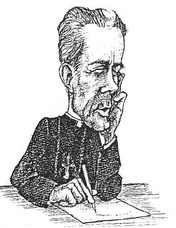
The words and deeds of Pope Francis since his election earlier last year have been so little Catholic and so outrageous, that the idea that recent popes have not really been Popes (”sedevacantism”) has been given a new lease of life. Notice that Pope Francis merely expresses more blatantly than his five predecessors the madness of Vatican II. The question remains whether any of the six Conciliar Popes (with the possible exception of John-Paul I) can really have been Vicars of Christ.
The question is not of prime importance. If they have not been Popes, still the Catholic Faith and morals by which I must “work out my salvation in fear and trembling” (Phil. II, 12) have not changed one iota. And if they have been Popes, still I cannot obey them whenever they have departed from that Faith and those morals, because “we ought to obey God rather than men” (Acts, V, 29). However I believe in offering answers to some of the sedevacantists’ arguments, because there are sedevacantists who seem to wish to make the vacant See of Rome into a dogma which Catholics must believe. In my opinion it is no such thing. “In things doubtful, liberty” (Augustine).
I think that the key to the problem of which sedevacantism is merely one expression is that Vatican II was a disaster without precedent in all the history of the Church of Jesus Christ, while at the same time it was the logical conclusion of a long decadence of the Catholic churchmen reaching back to the late Middle Ages. On the one hand the divine nature of the Catholic Church and the principles governing any of its crises, including the Conciliar crisis, cannot change. On the other hand the application of those principles must take into account the ever changing human circumstances within which those principles operate. The degree of human corruption today has no precedent.
Now two of the unchanging principles are that on the one hand the Church is indefectible because Our Lord promised that the gates of Hell would not prevail against it (Mt.XVI, 18). On the other hand Our Lord also asked if he would find faith on earth at his Second Coming (Lk. XVIII, 8), an important quotation because it clearly suggests that the Church will almost completely have defected at the end of the world, just as it seems to be almost completely defecting in 2014. For indeed if we are not today living through the end of the world, we are surely living through the dress rehearsal for that end of the world, as Our Lady of La Salette, the Venerable Holzhauser and Cardinal Billot all suggest.
Therefore today, as at world’s end, the defection can go very far. It cannot reach beyond the power of Almighty God to guarantee that his Church will never altogether disappear or fail, but it can reach as far as God will allow, in other words nothing need stop his Church from defecting almost completely. And just how far is that “almost completely”? God alone knows, and so time alone can tell, because none of us men are in the mind of God, and only the facts can reveal to us after the event the contents of the divine mind. But God does partly reveal his mind in Scripture.
Now as to the end of the world, many interpreters of Chapter XIII, 11-17 of the Apocalypse think that the lamb-like Second Beast serving the Antichrist is the authorities of the Church, because if those authorities resisted the Antichrist he could never prevail, as Scripture says he will. Then is it so extraordinary if in the dress rehearsal for the end of the world the Vicars of Christ talk and behave like enemies of Christ ? Against this necessary background, next week’s “Comments” will propose answers to some of the sedevacantists’ main arguments.
Kyrie eleison.
© 2011-2014 Richard N. Williamson. All Rights Reserved.
A non-exclusive license to print out, forward by email, and/or post this article to the Internet is granted to users who wish to do so provided that no changes are made to the content so reproduced or distributed, to include the retention of this notice with any and all reproductions of content as authorized hereby. Aside from this limited, non-exclusive license, no portion of this article may be reproduced in any other form or by any other electronic or mechanical means without permission in writing from the publisher, except by a reviewer who may quote brief passages in a review, or except in cases where rights to content reproduced herein are retained by its original author(s) or other rights holder(s), and further reproduction is subject to permission otherwise granted thereby.




